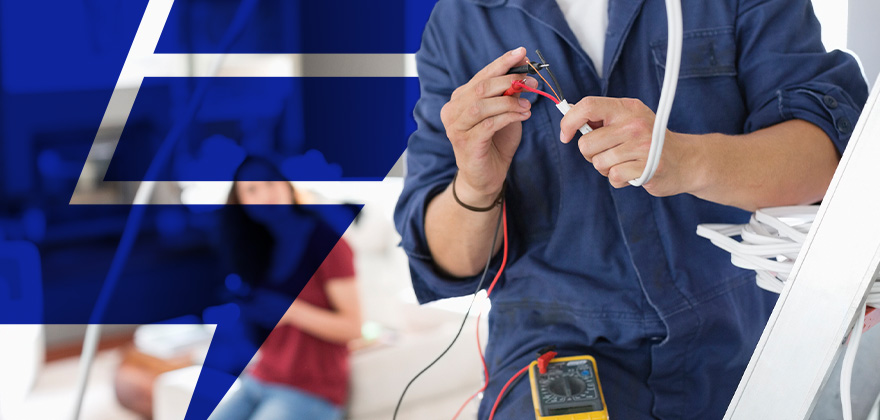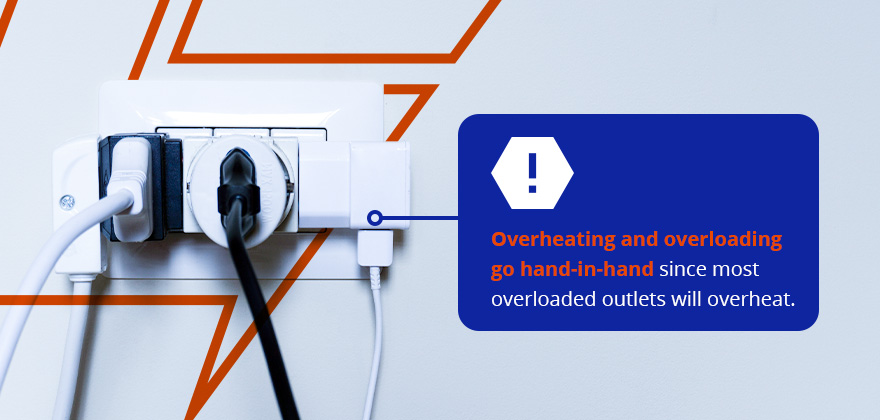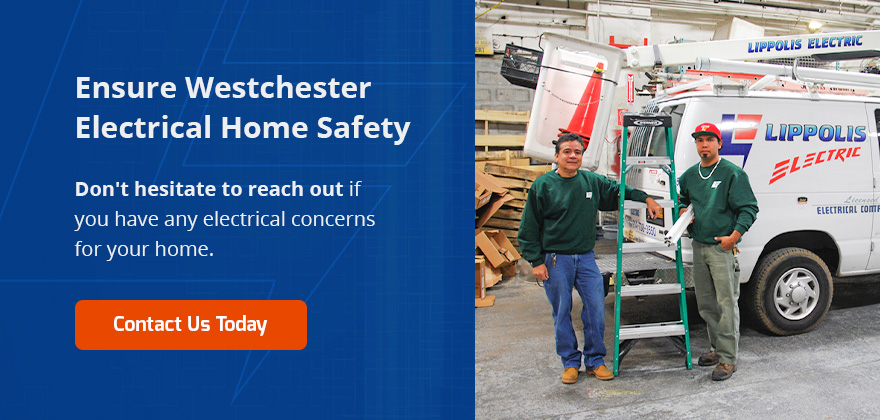Electrical Home Safety Tips

Most people power their homes with electricity, but not everyone understands the importance of electrical and appliance safety. You can avoid electrical-related accidents and injuries by implementing the proper safety tips at home. Learn more about these hazards and the best electrical safety tips for keeping yourself, your family and your pets safe.
Electrical Safety Precautions and Hazards
Understanding the importance of electrical safety at home is essential. On average, electrical fires account for over 50,000 fires annually. They’ve resulted in more than 500 deaths, over 1,400 injuries and more than $1 billion in property damage. Although electrical outlets and power cords can be safe with proper use, you can encounter several hazards, including:
- Exposed cables
- Poor wiring
- Overloading
- Overheating
- Damage to cords
- Unprotected outlets
- Improper electrical use
- Unsafe appliance use
- Water exposure
10 Electrical Safety Tips at Home
Electricity is essential for powering many appliances in your home. Though electricity eases you through everyday activities, it’s imperative to exercise the proper electrical home safety tips to prevent damage and injuries.
From small actions like unplugging your unused appliances to preventive tasks like using outlet covers, you can keep yourself, family members and pets safe from electrical-related incidents. Check out these working-from-home safety tips:
1. Follow the Instructions for Appliances
Instructions and user manuals provide vital information about your appliances. Understanding your devices’ limits is essential for preventing misuse that could lead to fires.
Correctly using your appliances also improves their long-term performance. That way, you can maximize their usage and save on replacements or repairs. If you notice even a slight electrical problem with an appliance, such as a small electrical shock, stop using the appliance immediately and contact a professional.
2. Use Extension Cords for Temporary Needs
Extension cords should only be a temporary solution for your electrical needs. You shouldn’t consistently rely on them to run appliances or use them too frequently.
These cords can deteriorate quickly, making them a larger hazard for electrical shocks or fires. If you don’t have enough outlets for your daily needs, contact an electrician to determine how you can better suit your appliances and devices.
3. Avoid Overloading Outlets
Overloading your outlets can cause a wide range of electrical issues. The wire insulation could melt, you could lose power to multiple locations and a fire can occur in extreme cases.
To avoid overloading your outlets, refrain from using extension cords for appliances. Plug only one appliance into an outlet at a time and monitor power loads closely. If your outlets get warm, turn off the appliances in that outlet and request a service from a qualified electrician.
4. Watch for Overheating

Outlets should be cool to the touch. Overheating and overloading go hand-in-hand since most overloaded outlets will overheat.
However, there are other reasons for overheating. For example, running a cord under a rug can cause the cord to overheat. Additionally, using lightbulbs with the wrong wattage can cause overheating, making it essential to understand your electrical capabilities.
You can also prevent overheating by ensuring proper circulation. Avoid running appliances in enclosed spaces, such as cabinets, and avoid pushing appliances directly against any walls.
5. Repair or Replace Damaged Cords
One of the most important tips to remember is to replace or repair any damaged cords. Damaged power cords can pose a serious danger, potentially leading to fires and electrocution.
Regularly check your cords during electrical maintenance for signs of damage and address them as quickly as possible. Do not run cords under rugs or furniture or staple these cords in place. These actions can damage your cords and make it more challenging to identify problems.
6. Remove Tripping Hazards and Store Cords Properly
Safe storage and organization is another critical electrical safety tip. Keeping electrical cords on the floor — especially in high-traffic areas — can pose tripping hazards and lead to premature damage. For example, running cords under rugs can cause them to overheat. It also increases tripping risks for those walking over the rugs.
Pets and children may also discover these cords and chew on or play with them, causing damage and threatening their safety. Proper cord storage can reduce tripping hazards and boost longevity. Avoid wrapping cords tightly around any object and never leave a cord on a hot surface.
7. Replace Loose-Fitting Outlets
Each outlet in your home should provide a snug fit for any plug. If you notice a loose outlet, avoid using it until you can address the problem. Using a loose outlet can increase the risk of overheating and electrical shocks. A tight, strong connection is necessary for proper current flow. Contact a professional to replace these outlets so you can safely use them in the future.
8. Use Safety Covers to Protect Children and Pets
Safety covers can protect your children and pets from electrical accidents. Safety caps cover the open holes in your outlets, preventing children from sticking fingers or objects inside the outlets. These caps are challenging for kids and pets to remove, further protecting them from potential shocks.
9. Unplug Unused Appliances and Install Fire Alarms
One of the easiest tips for preventing electrical accidents is one that many people forget. Simply unplugging unused appliances can reduce hazard risks. It can prevent overheating and protect appliances from power surges. This action also conserves power by reducing phantom drain when the devices aren’t in use.
If you habitually forget to unplug your appliances, you can implement smart plugs to set power schedules for your outlets. Additionally, devices like alarms for early fire detection can minimize potential damage if you forget to unplug an appliance.
10. Leave Electrical Projects to the Professionals
While you can complete some small electrical-related projects at home, it’s almost always best to leave electrical work to the professionals. For example, you can insert outlet caps yourself, but you shouldn’t attempt to address a loose-fitting outlet without professional assistance.
Electrical professionals provide the necessary services to ensure your safety, protecting your home and family from potential damage. The pros at Lippolis Electric, Inc. have decades of industry experience. We can provide high-quality work to ensure your satisfaction and safety.
Ensure Westchester Electrical Home Safety
Lippolis Electric, Inc. has over 30 years of experience in the electrical industry. We’ve developed the necessary skills and knowledge to deliver the best services and results to every customer. Our on-call team of bonded, insured and licensed technicians is always available to deliver prompt, expert service.
Don’t hesitate to reach out if you have any electrical concerns for your home. Contact our team for service information or quotes.

Schedule service
Please note that your appointment is not set until confirmed by Lippolis Electric shortly after you've submitted the form.
| ‹ | › | |||||
| Sun | Mon | Tue | Wed | Thu | Fri | Sat |

